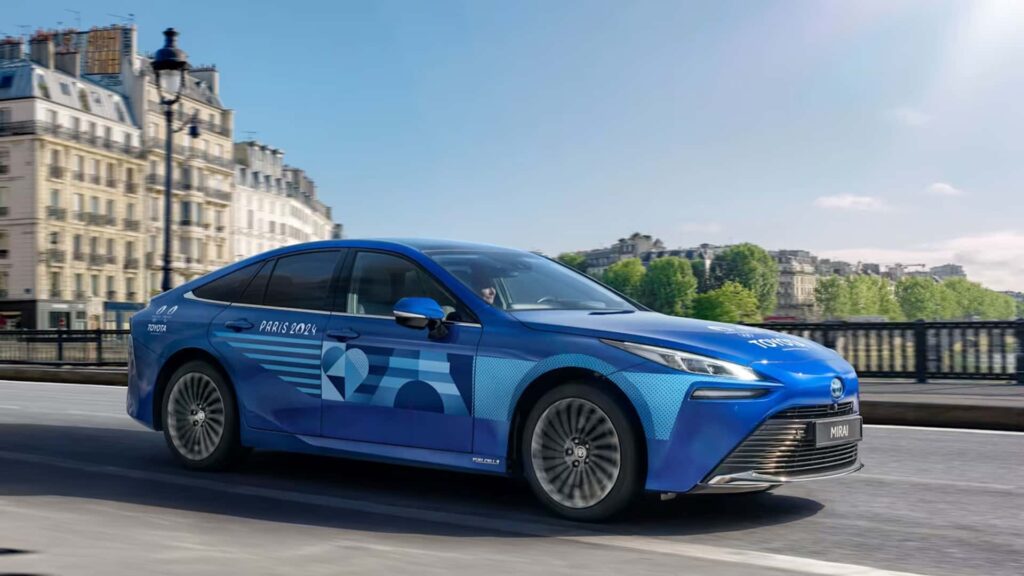This year's Summer Olympics will feature 500 Toyota Mirai cars powered by hydrogen fuel cells — and scientists aren't happy.


Toyota
July 15, 2024 in 9:00 AM ET
The 2024 Summer Olympics in Paris is less than two weeks away from kicking off on July 26. Organizers are touting the Games as the “greenest ever,” with carbon dioxide emissions halved compared to previous Games. But a group of scientists, engineers and academics are unhappy with the official vehicles selected for the games.
Toyota has been a major sponsor of the Olympics for many years, and is using 500 hydrogen fuel cell-powered Toyota Mirai cars to transport athletes around Paris. But even though the cars are emission-free, a coalition of 120 British and US scientists has written a letter opposing their use.
Mirai's Mirage
The Toyota Mirai was supposed to be the future of transportation. With zero emissions and the prospect of hydrogen fueling stations the size of traditional gas stations, it was the perfect solution. But the revolution never happened. With most commercial hydrogen still made from fossil fuels, crumbling infrastructure, and plummeting resale values, the Mirai has become an undesirable car that owners have a hard time parting with. And now scientists want to remove it from the list of official vehicles for the 2024 Paris Olympics.
“We are writing to express our concern that Toyota's push for hydrogen vehicles is not scientifically consistent with net zero and will damage the reputation of the 2024 Olympic Games,” it said. Hydrogen Insight And CNN: “There is still an opportunity for rerouting, and we urge you to require Toyota to replace the Mirai with an electric vehicle as the official Olympic vehicle.”
The group, which included scientists and engineers from the universities of Cambridge, Oxford and Colorado, said 96% of the world's hydrogen is still produced from fossil fuels such as methane gas, and most hydrogen-powered cars like the Mirai are far more polluting than pure EVs and only slightly cleaner than traditional internal combustion engine vehicles.
Toyota Mirai at the hydrogen pump
Achieving the 2024 Olympics' ambitious green energy goals will require vast solar panels, structures that can be used after the Games are over, and of course the Mirai sedans. But even fueling hydrogen cars is as difficult as it is anywhere else.
There are fewer than 10 hydrogen fueling stations in the entire city of Paris, home to this year's Olympics. According to the European Hydrogen Fueling Station Availability System, a public-private partnership that supports research and innovation activities in hydrogen technologies in Europe, Paris has eight hydrogen fueling stations, but three are unavailable as of this writing. That number has dropped to just three, according to the European Hydrogen Observatory.
So how will Toyota fuel the 500 Mirai FCEVs that will transport athletes and officials around the French capital? According to CNN, the company plans to use hydrogen extracted from water and organic matter produced from renewable sources.
It will likely include some portable hydrogen stations that will disappear once the Olympics are over, leaving taxi drivers who pick up the keys to their Mirai after the event stranded with cars for which refuelling is a logistical nightmare.
Gallery: 2021 Toyota Mirai (US spec)
6 photograph
Toyota and the organizers of the Paris 2024 Olympic Games plan to deploy more than 2,650 electric vehicles, including 1,150 battery-powered EVs, 500 Mirai fuel cell electric vehicles, 10 hydrogen buses, and approximately 250 battery-powered Accessible People Movers (APMs).
Still, the Mirai has been a consistent source of controversy in recent years, especially in the United States. Despite Toyota continuing to invest heavily in the fuel cell technology it pioneered, Mirai owners have sued and demanded buybacks, citing a lack of refueling stations, the prohibitively high price of hydrogen, and an overall feeling of being misled by the manufacturer.
In the US, multiple hydrogen stations have been closed, leaving Mirai owners scratching their heads as they're forced to drive dozens of miles to refuel. When InsideEVs spoke to several owners of Toyota's flagship hydrogen sedan, they found themselves faced with long lines or no stations available. “The whole H2 vehicle experience is a failed experiment,” one Mirai owner told InsideEVs earlier this year. “I never expected to buy a car from Toyota and feel cheated, deceived and misled.”
read more

